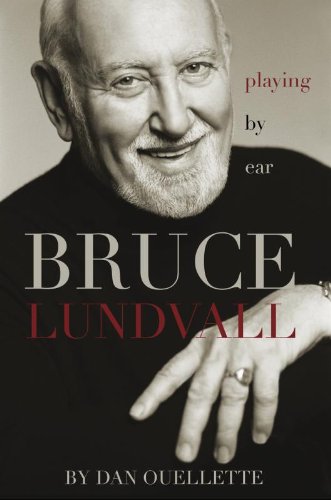Most jazz fans are familiar with Dan Oulette from his numerous feature articles and artist profiles in DownBeat Magazine. Dan has also authored a biography on master bassist Ron Carter and has conducted over 100 “blindfold tests” for DownBeat, in which he quizzes artists by playing them a recording of a fellow musician, then eliciting a review and rating of what was presented (often with surprising and sometimes humorous results).
Dan’s latest project was over three years in the making. He explores the remarkable life of legendary record executive Bruce Lundvall, an honest man in a slippery industry, who facilitated the careers of jazz greats Herbie Hancock, Dexter Gordon, Joe Lovano, and Dianne Reeves as well as popular music icons Willie Nelson, Norah Jones, Phoebe Snow, and Bobby McFerrin. Lundvall’s remarkable career spans over 50 years at Columbia, Elektra/Musician, and Blue Note Records. He reactivated the legendary Blue Note label in 1984, and still serves as Blue Note chairman emeritus.
There are three ways of writing about someone’s life. In an unauthorized biography, the author often sensationalizes matters and quotes the subject’s enemies, manufacturing scandal. In ghost writing, the author spends time talking to the subject then tries to write as if he were that person. In an authorized biography, the author does his homework, interviewing not only the subject, but his colleagues and family members, reporting with accuracy. Oullette took the high road here, and spent many sessions interviewing Lundvall and the many artists who respect him, then presented events in chronological order.
Lundvall’s life is examined, with chapters zeroing in on the artists he signed and nurtured. It becomes apparent that Bruce was soul brothers with tenor giant Dexter Gordon. He also bonded with trumpeter Woody Shaw, and loved spinning stories with saxophonist Joe Lovano over elegant dining adventures. You also see different sides of the legendary artists Bruce tried to assist, despite their personal shortcomings. Was Stan Getz a wonderful warm man or a paranoid, sometimes conniving, drug addict? The answer is not black and white, but somewhere in between.
The relationship between Lundvall and legendary jazz producer Michale Cuscuna is well explored. Cuscuna remarks that “Bruce is tireless in supporting his artists…He club hops like a 25-year-old…has a great sense of humor and great taste in wine, food, and people.” While Lundvall earned the nickname “Dr. Yes,” for agreeing to the artistic wishes of many of the talented musicians he worked with, the book also credits Bruce’s general manager, Tom Evered (aka “Mr. No”) with balancing the books at Blue Note.

Although Lundvall, Evered, and Cuscuna worked in harmony, the book also details Bruce’s many frustrations with other executives, including Clive Davis and Elektra’s Bob Krasnow. You really get a sense that most of these executives questioned “Why in the hell do we need to do jazz?,” whereas Bruce loved the music and thus defended the career of Dexter Gordon (who struggled to sell 40,000 units) just as much as a Norah Jones (40 million albums sold).
Tor Lundvall, one of Bruce’s three sons,” testifies” in one of the later chapters, saying, “I strongly believe that my father’s sense of humor and eternal optimism are essential to his success and resilience. He’s never let anyone or anything grind him down.” Lundvall, addressing record company employees says, “I continue to support the most adventurous artists in jazz…I also have a commercial vision.” Within a few chapters of this book, it’s clear that no one has ever better balanced a deep love for the art of jazz with the commercial realities found in a sometimes difficult and unethical workplace.
Ever the philosopher, Bruce also delivers some great zingers. One of his best: “Life is short, art is long, jazz is forever.” Amen!
In related news Doyle New York is auctioning off artwork from Lundvall's private collection, click here for more info.